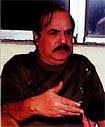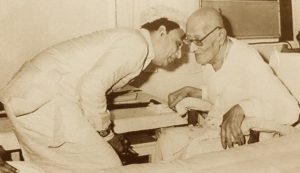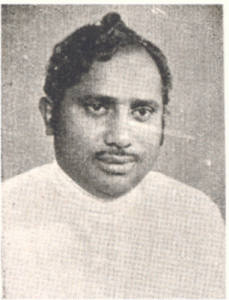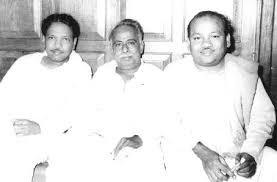The Risk Taker
by Sachi Sri Kantha, January 4, 2021
I provide fellow MGR biographer R. Kannan’s comments on the previous chapter Part 58, which I received by email of Nov.15, 2020.
“I think the story of MGR’s angst on the insinuations is well brought out in the way the story is told and the translations. You have mentioned Kalaignar Karunanidhi’s autobiography to suggest a link between Mohan Kumaramangalam and the award to MGR. Kalaignar Karunanidhi implicates Mohan Kumaramangalam heavily behind weaning MGR away from the DMK and his allegations against Kalaignar Karunanidhi and his cabinet colleagues. You are aware that after MGR broke away Navalar Nedunchezhian alleged that the award would have gone to Sivaji Ganesan and that the DMK leadership skewed it to MGR. MGR scoffed at this. I have referred to this in my book.”
Kannan’s comments are well taken. As for Nedunchezhian’s hyperbole thoughts, I can assert that the decision of the national Selection Committee (always under the whims of the top banana at New Delhi at that time – read as Indira Gandhi) for a national award couldn’t have cared less for Sivaji Ganesan (1928-2001). The simple reason was, then he belonged to Indira’s adversary K. Kamaraj’s Congress Party. Only after the death of Kamaraj in 1975, like R. Venkataraman (1910-2009), Sivaji Ganesan moved into Indira’s Congress Party.
The Risk Taker
Kondath Mohandas (1932 – ?), who would play the Man Friday role to MGR after he became the Chief Minister, wrote in his 1992 memoirs that “MGR told me, ‘life was not worth it without risks’.” In cinema, after becoming the ranking hero in mid 1950s, MGR took the first risk in limiting the range of his character portrayals in story plots by strictly adhering to his principles of ‘no smoking, no drinking, and no violence to women’ to elevate himself as the most popular actor in Tamil cinema for two decades. In this, he was an exception among the actors in India, if not in other countries as well.

Kondath Mohandas
In 1950s, having a cigarette in lips or hand as a character prop was considered as a ‘natural’. MGR swam against the current, and proved that he was a visionary to the extent that an analytical study published in Pediatrics journal in 2009, based on 532 contemporary Hollywood movies in which 3,848 major characters smoked supported MGR’s deep conviction. The conclusion of this study, originating from Dartmouth Medical School, New Hampshire (USA) inferred, “….Because smoking occurs in almost all movies, parents should limit movie viewing and specifically should restrict access to R-rated movies, which tend to contain more smoking. Parents also need to be aware that adolescents whom they may consider to be at low risk for smoking (because they seem low in sensation-seeking) may be affected much more strongly by movie smoking. When youths do view movies and other media containing smoking, we suggest that parents should talk with their children and adolescents about smoking in the movies, in an effort to ameliorate any influence toward pro-smoking attitudes or smoking uptake.” No doubt that MGR would have been proud of his anti-smoking stance in the characters he depicted in his movies, since 1950s.
In politics too, MGR took his first risk in October 1972, in establishing a break-away party that would capture power within 5 years, in competition with the parent party from which he was thrown out. Subsequently, he would take the second risk of his political life, in establishing the Noon Meal scheme for children in 1982 at a larger scale, despite much criticism from economic pundits. I would add, MGR’s third risk of his political life, was the one to which Mohandas had alluded to, in offering a helping hand to the Eelam Tamil militants (Liberation Tigers of Tamil Eelam) in their fight against the fascist Sinhalese regime.

MGR and Rajaji in late 1972
In the March 23, 1992 issue of Junior Vikatan’s series on Police Folks, a police intelligence officer bragging about the success they had in de-linking MGR from DMK party, at the prompting of ruling Congress Party’s high command in New Delhi received some highlight. That expose was titillating for Tamil Nadu masses, because it went against the image cultivated by MGR in his movies. It depicted MGR, in real life, as a ‘thigh shaker’ in front of law enforcement and as an individual who was galloping on the wrong side of the law. One shouldn’t place much credence for such bragging due to the unverifiable nature of the expose; AFTER the deaths of three principals involved in the story. Mohan Kumaramangalam died in 1973, Indira Gandhi died in 1984, and MGR died in 1987. This particular ‘intelligence police officer’ had the temerity to open his mouth anonymously, only in 1992, AFTER 20 years of the described event. If he had opened his mouth, while at least Indira and MGR were living, there could have been some positive significance to the news leak. By connecting the dots (1. the timing was rather coincidental to the publication year of the memoir ‘MGR: The Man and the Myth’; 2. The officer’s police intelligence background and work location; 3.affinity to MGR, by being a native of Kerala state), my conjecture is that the so-called police intelligence officer of the Junior Vikatan’s ‘leak’ could have been either Mohandas or a close associate of him.
For whatever confidences Karunanidhi revealed in public, such as demanding a Cabinet minister position after the 1971 election (see below), or those who assaulted MGR about his Kerala origin, MGR did respond promptly in kind openly.
Kannan’s biography records a tally of those who followed MGR, after his expulsion from DMK. Immediately after expulsion (Oct. 18), 6 DMK members of the legislative assembly (MLA) joined MGR. They were, K. Kalimuthu (1942-2006), G.R. Edmund (1931-2013), Munu Adhi (2926-2005), C. Aranganayagam, S.M. Durairaj and P. Soundarapandiyan. By November 1, there were 9 MLAs from DMK and two MPs. S.D. Somasundaram (1930-2001, DMK MP for Thanjavur) and K.A. Krishnaswamy (1932- 2010, a DMK member of Rajya Sabha). How did Karunanidhi describe, MGR’s activities after his expulsion?
“MGR tried his utmost to rope in few disgruntled persons from the party. As such, the then Speaker of the legislative assembly, my dear friend Mathiazhagan raised flags of opposition. He had wanted to quit the party and the Speaker position But, MGR and the guys who were needled by Mohan Kumaramangalam rounded Mathiazhagan and propelled him to work against the party, while holding the position of the Speaker. When I heard about this, I sent friend S.D. Somasundaram (S.D.S.) to talk with Mathiazhagan. For that, initially Somasundaram was unwilling, saying, ‘I’m not keen to meet him for his anti-party activities’. But, I was the one who forced him to go.
After a long discussion, S.D. Somasundaram returned to tell me, that Mathiazhagan’s thoughts are disagreeable, and with MGR he also believed that the government will be toppled, and there’s no use talking with him. I sent S.D.S. to Mathi once more, because they had a very cordial relationship. Mathiazhagan had an excellent talent in attracting others to his line of thinking. Then, I realized the fault I made. S.D.S. himself had joined with Mathi, and had become a member of MGR’s new party. Only a week previous to that, at a meeting Kuthalam region, S.D.S. participated at a meeting with me, and strongly criticized MGR.”
Brief chronology from Oct. 1972 to Dec. 1972
Oct.16: MGR established his new party in Alandur, a suburb of Chennai. It was named, Anna DMK, in honor of his mentor Annadurai, the founder of DMK party. He was member No.1. The No.2 was K.A. Krishnaswamy was a younger brother of K.A. Mathiazhagan (1926-1983), the then Speaker of the Tamil Nadu Assembly. Krishnaswamy was also expelled for violating the party discipline

M. Rajangam, then MP for Dindigul (1971-1973)
Oct. 22: Death of Mayandi Thevar Rajangam, the then DMK MP for Dindigul, who had joined MGR’s party. This particular death, though a bad omen then, later turned out to be a silver lining for MGR’s fledgling party, in May 1973, when by-election was held.
By joining hands with M. Kalyanasundaram (1909-1988), a Communist Party of India leader and then MP for Tiruchirappali, MGR organized three demonstrations in November 1972. Chronology follows:
Nov.10: led a procession to Raj Bhavan. Aim: to express people’s agony to the Governor of Tamil Nadu. According to Karunanidhi, Mathiazhagan had observed this procession from a spot at Anna Salai, He commented it was ‘a victory for the Communist Party’, thus negating the MGR’s appeal to the masses.
Nov.13: Tamil Nadu Legislative Assembly met. According to Karunanidhi, once the Speaker took his seat, MGR and few of his supporters stood up and proposed a No Confidence motion against the government, disregarding all the Standing Orders, for such a No Confidence motion. Karunanidhi’s allegations were, ‘On this day, Tamil Nadu Assembly saw four incidences that had never occurred previously.
- Question and Answer Period, was omitted, and a Standing Order was debated for an hour, and sessions suspended unexpectedly; the Speaker acquiesced himself to this.
- The Speaker suspended the sessions, at the suggestion of Opposition leaders.
- While at his seat, the Speaker critiqued the government, expressed the view that law and order had been threatened and suggested that the ruling party should face an election again.
- After announcing that the sessions would continue for days, then the Speaker suspended the sessions at the end of the first day itself.
Nov.15: organized near total ‘hartal’ (mass protest, involving total shut down workplaces and shops) in Tamil Nadu, to protest against lawlessness and demonstrate ‘popular ill will’ against the DMK ministry.
Nov.19: Nanjil K. Manoharan (1929-2000), Lok Sabha MP for Madras North and K.A. Krishnaswami met with Indira Gandhi and the President V. V. Giri, to request for setting up an Inquiry Commission against the DMK ministry.
Nov. 26: organized a demonstration as a ‘Voters’ rally’ throughout Tamil Nadu.
Nov.28: The Governor of Tamil Nadu, summoned the Tamil Nadu legislative assembly to meet on Dec. 2nd.
Dec.2: Unprecedented scenes of confusion took place when the Tamil Nadu Legislative Assembly met at 11 am. Two parallel sessions were held simultaneously. One was a resolution read by Arcot Veeraswamy of DMK and supported by 185 members, about removing the Speaker of the Assembly, Mathiazhagan. Then, the deputy Speaker P. Sreenivasan began to conduct the proceedings, from a temporarily placed chair. While Mathiazhagan ignored this, and conducted his session on the No Confidence motion proposed by MGR and his colleagues in the Assembly. When MGR began speaking, his microphone was turned off, but he continued to speak. What he spoke then was inaudible to fellow members and the press gallery. MGR stopped speaking only at 2:00 pm, after Mathiazhagan suspended ‘his’ session. Deputy Speaker continued ‘his’ session until 3:00 pm. MGR left the assembly saying to the press reporters, ‘Democracy has been killed here. I’ll not enter this place again.’

Karunanidi, Anna and Mathizhagan (from left)
Dec.25: C. Rajagopalachari (Rajaji), former Chief Minister of Madras Presidency, and the founder-leader of the Swatantra Party died.
A passing mention on Mathiazhagan (1926-1983) may be needed here. Though Karunanidhi had praised him as one who could influence others by his ‘personality’, Mathiazhagan was not made up with leadership mettle. In the early days of the DMK history, he was hailed as one of the five ‘top leaders’ of the party; but he succumbed to alcohol’s influence and his star faded with time. Though he moved into MGR’s party in 1972, within two years Mathiazhagan returned to Karunanidhi’s fold. The main reason was, whatever the merits they had, temperamentally MGR never came to pin his hopes on those who had surrendered themselves to alcohol. Mathiazhagan died at the age of 56!
Karunanidhi’s ‘Below the belt’ punch on MGR
After he was rejected by the Tamil Nadu voters in preference to MGR, at the 1977 Tamil Nadu state assembly elections, Karunanidhi poked fun at his one-time pal and benefactor, in an interview with the ‘India Today’ as follows:
‘Pure cine glamour has brought him success,’ the 48-year-old Karunanidhi told India Today in his Madras home last week. ‘He was a stunt actor, nothing more. He used the films to project himself. He painted himself as God. As in his films, he also plays a double role in his politics. He wants prohibition to show people his Gandhian ideals. What ideals? He is not even a true Tamilian. Although he gives his age as 61, people say he’s at least 65 or 66.’
In fact, there was a slip in the quoted age of Karunanidhi, when this feature appeared in the India Today of Aug. 15, 1978. Karunanidhi (born in 1924), was 54 years old then. We don’t know whether Karunanidhi himself mentioned his age as 48 to gullible reporter, or the reporter failed in his fact checking to find Karunanidhi’s birth year.
Another journalist critic observed in 1976,
“When Karunanidhi fell out with M.G. Ramachandran, the only telling point he could make against his adversary was that he was not really a Tamilian but born in Kerala. This, despite the fact that Ramachandran cannot speak any language other than Tamil.”
It was unfortunate that Karunanidhi’s vanity overruled simple decency one would expect from a friend, who benefitted the most in the rivalry for post-Anna DMK leadership in 1969. For such ingratitude, Tamil Nadu voters would see that as long as MGR was alive, Karunanidhi wouldn’t reach the chief minister rank again, either alone or in alliance with other parties (such as Indira Gandhi’s Congress).
MGR’s Response in the same issue of ‘India Today’
In an interview to Sunil Sethi, for the India Today’s cover story (Aug.15, 1978), MGR looked back about his 1972 expulsion from the DMK party as follows:
Question: What do you think films and politics have in common?
MGR: I first made contact with the people through my films. Now in politics I find that I can contact more people than before, and the people are more attached to me. Politics, like films, is a matter of communicating with the people.
Question: So would you say that you have used film as a medium for political propaganda?
MGR: Yes, of course. I have used my films to explain my policies and programmes through the dialogues and the stories.
Question: But surely there are points of difference. For instance, you are not really the person you project in your films?
MGR: For any man it is not enough what he thinks of himself. The people should believe what he is. If I was not really what I am projecting on the screen, then the people would have abandoned me long ago. For more than 30 years I have been trying to project what I really am. This should be understood in perspective. I have acted the part of a handcart puller or coal miner in two of my most popular films. Well, if you asked me if I actually lived like the characters I have portrayed, the answer would be obvious. In the circumstances, I would not be able to live like I want to. But I live with as much simplicity as possible, despite what I could otherwise afford.
“Question: Together with Karunanidhi you founded the DMK. When you parted company with him in 1972, was it because of an ideological rift or over specific issues?
MGR: As the treasurer of the DMK in 1972 it was my duty to know the party accounts. Certain sums of money were being received by the party and being spent without proper accounting to the general council. We were not aware of how it came and where it went. This was the first issue. The second was that people like Kamaraj [the late leader of the Congress(O) group in Tamil Nadu] and others were claiming that a lot of the DMK people had gained wealth and they wanted to know how. This was also the general impression. If these allegations were made against the party they should have been examined by a committee to be constituted by the general council of the party. This was my request; and I made this request to clear doubts in the minds of the people about the DMK. On October 8, 1972 at a public meeting I pledged before the statue of the late Annadurai to take action against the allegedly corrupt members of the DMK. I sent a message to the party saying that on October 10, I would come to the office and the accounts of the party should be shown to me. But by the morning of the 10th I received a notice saying that I had been suspended from the party for alleged anti-party utterances. So there is a big difference between leaving the party and being thrown out. I was sacked.
Question: Karunanidhi alleges that you quit the party because you wanted a ministership in his cabinet, which he was only prepared to offer if you gave up film acting. Is this true?
MGR: Karunanidhi is a good story writer and a powerful dialogue writer. I have acted in films where he has written the story and dialogues. When he was chief minister I acted in his films and helped him clear his debts. His brother-in-law, Maran, has said so at a public function recently. Had he asked me not to act if I wanted to become a minister, could I have not asked him how he could continue to write stories and dialogues for films as chief minister? And if I really wanted a ministership I could easily have requested the late Annadurai for one. In fact when Annadurai prepared his cabinet list he sent it to me in hospital where I was undergoing treatment, and accepted all the suggestions I proposed. Even then I could have asked for a ministership. In fact many wanted me in the cabinet but I declined. I am only at a loss it seems after becoming chief minister.”
MGR’s reference to acting in Karunanidhi’s film was to ‘Engal Thangam’ (1970; Our Gold), produced by Murasoli Maran, Karunanidhi’s nephew. But, it was promoted as ‘Kalaignar’s Engal Thangam’. Furthermore, while being the chief minister of Tamil Nadu, Karunanidhi also wrote script and promoted his son M.K.Muthu’s debut movie ‘Pillaiyo Pillai’ (1972, Son O’ Son), again promoted as ‘Kalignar’s Pillaiyo Pillai’.
An interview to the New York Times
In March 1973, MGR gave an interview to the New York Times reporter Bernard Weinraub. Excerpts from the published version were:
“The most widely held belief is that Mr. Ramachandran, who is known as M.G.R., left out of pique at the Chief Minister of Tamil Nadu, Muthuvel Karunanidhi, a screen writer and poet. It is common gossip that the Chief Minister, uneasy about the growing personality cult of Mr. Ramachandran, had sought to create, in the person of his son Muthu, a younger screen rival who would dent the star’s swashbuckling image. The son has not quite emerged as a box office attraction. Mr. Ramachandran scoffs at the gossip. ‘Ridiculous, silly,’ he said as he sat on a lawn in the pink‐walled Vijaya Gardens Studio. ‘I’ve been a star since 1935. I make 9 to 10 pictures a year. No one has stayed on like me. The Chief Minister’s son played my life on the stage—my biography—isn’t that something?’ said Mr. Ramachandran, taking a bite of pakora, a spicy dough filled with potatoes and vegetables. ‘How can that be a rival to M.G.R.?’
What the actor alleges is that DMK leaders have misused election funds and have benefited from state contracts involving industrial projects. ‘I wanted a party whose leaders had clean hands,’ he said. ‘Everyone knows what’s going on. The DMK has turned into a party of the corrupt’ ”
Corruption Complaint – A Non-Issue
MGR’s focus on pulling down Karunanidhi’s ministry on the corruption complaint to Indira Gandhi was a non-issue, as he would come to rue later. This was because, corruption was part of life in India, since time immemorial. As Inder Malhotra, a biographer of Indira Gandhi, stressed in two pages the Congress Party led by Indira had same issues throttling it’s neck. It had prevailed since, Nehru’s period. Excerpts:
“Corruption was nothing new in India. It had been a part of the country’s life from time immemorial, as testified by the ancient sage Kautilya in his masterpiece on statecraft, Arthashastra. Over the years, it had grown steadily. The heavy regulation of the economy by the state since independence had opened up new possibilities of graft for both politicians and civil servants….
However, people expected Indira Gandhi’s party, committed to bringing socialism to the country, to be more honest and cleaner than the old undivided Congress. But this turned out to be a vain hope…”
But Inder Malhotra, distinguished a difference the operating style between father (Nehru) and daughter (Indira). To quote,
“Her father had taken care never to soil his own fingers with fund collection for the party. The task was usually assigned to an outstanding leader – Sardar Patel, Nehru’s Deputy Prime Minister, Morarji Desai, and S.K. Patil, in that order – and he himself had nothing to do with it, except to ensure that there was no scandal. Indira decided to keep a tight control over the collection of disbursement of funds. Inevitably, it became a talk of the town that ‘suitcases full of currency notes’ were being routinely taken to the Prime Minister’s house. S.K. Patil was quoted as having said that she ‘did not return even the suitcases’. ”
Thus, MGR’s accusation against Karunanidhi’s DMK as ‘a party of corrupt’ made no big impression on Indira Gandhi.
Cited Sources
C.P.R. Celluloid politicians of the South. India Today, Feb.29, 1976.
Robert L. Hardgrave Jr.: Politics and the film in Tamil Nadu: the stars and the DMK. Asian Survey, Mar 1973; 13(3): 288-305.
Ramashray Roy: India 1972: Fissure in the Fortress. Asian Survey, Feb. 1973; 13(2): 231-245.
Interview by Sunil Sethi: Politics, like films, is a matter of communicating with people – MGR. India Today, Aug.15, 1978.
Kannan: MGR – A Life, Penguin Random House, India, Gurgaon, Haryana, 2017.
Karunanidhi: Nenjukku Neethi autobiography, vol.2, Thirumagal Nilayam, Chennai, 1987, ch. 52 to 55, pp. 376 – 403. (in Tamil).
Inder Malhotra: Indira Gandhi – a personal and political biography, Coronet Books, London, 1991, pp. 144-145.
- Muthukumar: Vaadhyar: MGR Vazhkkai, Kizhakku Pathippgam, Chennai, 2009. (in Tamil)
- Ramasamy Sastry: A chronicle of the DMK split. Economic and Political Weekly, Mar. 30, 1974; 9(13): 527, 529-531.
Susanne E Tanski, Mike Stoolmiller, Sonya Dal Cin, Keilah Woth, Jennifer Gibson, James D. Sargent: Movie character smoking and adolescent smoking: Who matters more, Good Guys or Bad Guys? Pediatrics, 2009; 124: 135. doi: 10.1542/peds.2007-3420.
Bernard Weinraub: Movie idol leads sharp attack on Government of India State. New York Times, Mar. 26, 1973.